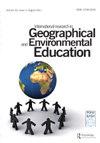空间思维和地理信息系统:发展和评估学生的能力
IF 3.1
Q2 EDUCATION & EDUCATIONAL RESEARCH
International Research in Geographical and Environmental Education
Pub Date : 2022-10-31
DOI:10.1080/10382046.2022.2138172
引用次数: 2
摘要
摘要抽象空间思维是地理专业学生培养的一项重要技能。虽然研究人员已经确定了许多空间能力,并且GIS的优点在已发表的文献中似乎无处不在,但关于如何评估学生的空间思维技能的工作却很少。因此,需要进一步研究空间思维与成绩和成就之间的关系。本研究调查了使用地理信息系统(GIS)对学生空间思维技能的影响,并尝试使用框架来评估其程度。这是通过设计和实施两种基于gis的干预措施来实现的。这个小规模的评估使用定性的方法来调查学生和教师的观点。学生的作业也被分析使用开发的框架评估空间思维能力。研究结果表明,地理信息系统的使用确实增强了,而且在大多数情况下提高了学生的空间思维技能,但是,空间思维很难量化,也很难衡量其进步。使用地理信息系统提供的另一个好处是使用真实数据创建引人入胜的现代互动课程,学生从中获得很多地理价值。本文章由计算机程序翻译,如有差异,请以英文原文为准。
Spatial thinking and GIS: developing and assessing student competencies
Abstract Spatial thinking is an integral skill for geography students to develop. Whilst many spatial competencies have been identified by researchers, and the merits of GIS seemingly ubiquitous in the published literature, little work has been done into how students’ spatial thinking skills can be assessed. Therefore, further investigation into the relationship between spatial thinking and performance and attainment is needed. This research investigates the impact using a geographic information system (GIS) has on students’ spatial thinking skills and attempts to assess the extent using a framework. This was done through the design and implementation of two GIS-based interventions. This small-scale evaluation used qualitative methods to investigate students’ and teachers’ views. Student work was also analysed using the framework developed for the assessment of spatial thinking skills. The findings suggest that the use of a GIS does enhance, and in most cases improves students’ spatial thinking skills, but, that spatial thinking is hard to quantify and difficult to measure progress in. Another benefit that using a GIS affords is the creation of engaging, contemporary and interactive lessons, using real data, from which students derive a lot of geographical value.
求助全文
通过发布文献求助,成功后即可免费获取论文全文。
去求助
来源期刊

International Research in Geographical and Environmental Education
EDUCATION & EDUCATIONAL RESEARCH-
CiteScore
5.20
自引率
33.30%
发文量
11
期刊介绍:
International Research in Geographical & Environmental Education publishes quality research studies within the context of geographical and environmental education. The journal endeavours to promote international interest and dissemination of research in the field, provides a forum for critique, and demonstrates the relevance of research studies to good professional practice.
 求助内容:
求助内容: 应助结果提醒方式:
应助结果提醒方式:


